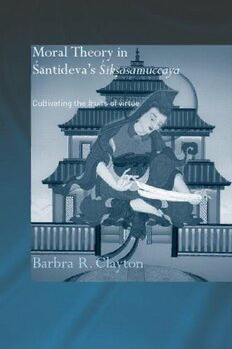Download Moral Theory in Santideva's Siksasamuccaya Cultivating the Fruits of Virtue (Routledgecurzon Critical Studies in Buddhism) PDF Free - Full Version
Download Moral Theory in Santideva's Siksasamuccaya Cultivating the Fruits of Virtue (Routledgecurzon Critical Studies in Buddhism) by Barbra Clayton in PDF format completely FREE. No registration required, no payment needed. Get instant access to this valuable resource on PDFdrive.to!
About Moral Theory in Santideva's Siksasamuccaya Cultivating the Fruits of Virtue (Routledgecurzon Critical Studies in Buddhism)
This important text analyzes the moral theory of the seventh century Indian Mahayana master, Santideva, author of the well-known religious poem, the Bodhicaryavatara (Entering the Path of Enlightenment) as well as the significant, but relatively overlooked, Siksasamuccaya (Compendium of Teachings). With particular focus on the Siksasamuccaya, this book uses original translations and critical analysis in order to answer the question: How would Santideva’s ethics be understood in terms of Western moral theory? Santideva’s ethical presuppositions and moral reasoning are illuminated by analyzing his key moral terms and comparing them to other Buddhist principles. By focusing on a neglected Buddhist Sanskrit text by a major Mahayana figure, Barbra R. Clayton helps to redress a significant imbalance in the scholarship on Buddhist ethics, which has - up to now - focused primarily on the ethics of the Pali literature as interpreted in the Theravada tradition.
Detailed Information
| Author: | Barbra Clayton |
|---|---|
| Publication Year: | 2006 |
| ISBN: | 9780203639962 |
| Pages: | 184 |
| Language: | English |
| File Size: | 1.256 |
| Format: | |
| Price: | FREE |
Safe & Secure Download - No registration required
Why Choose PDFdrive for Your Free Moral Theory in Santideva's Siksasamuccaya Cultivating the Fruits of Virtue (Routledgecurzon Critical Studies in Buddhism) Download?
- 100% Free: No hidden fees or subscriptions required for one book every day.
- No Registration: Immediate access is available without creating accounts for one book every day.
- Safe and Secure: Clean downloads without malware or viruses
- Multiple Formats: PDF, MOBI, Mpub,... optimized for all devices
- Educational Resource: Supporting knowledge sharing and learning
Frequently Asked Questions
Is it really free to download Moral Theory in Santideva's Siksasamuccaya Cultivating the Fruits of Virtue (Routledgecurzon Critical Studies in Buddhism) PDF?
Yes, on https://PDFdrive.to you can download Moral Theory in Santideva's Siksasamuccaya Cultivating the Fruits of Virtue (Routledgecurzon Critical Studies in Buddhism) by Barbra Clayton completely free. We don't require any payment, subscription, or registration to access this PDF file. For 3 books every day.
How can I read Moral Theory in Santideva's Siksasamuccaya Cultivating the Fruits of Virtue (Routledgecurzon Critical Studies in Buddhism) on my mobile device?
After downloading Moral Theory in Santideva's Siksasamuccaya Cultivating the Fruits of Virtue (Routledgecurzon Critical Studies in Buddhism) PDF, you can open it with any PDF reader app on your phone or tablet. We recommend using Adobe Acrobat Reader, Apple Books, or Google Play Books for the best reading experience.
Is this the full version of Moral Theory in Santideva's Siksasamuccaya Cultivating the Fruits of Virtue (Routledgecurzon Critical Studies in Buddhism)?
Yes, this is the complete PDF version of Moral Theory in Santideva's Siksasamuccaya Cultivating the Fruits of Virtue (Routledgecurzon Critical Studies in Buddhism) by Barbra Clayton. You will be able to read the entire content as in the printed version without missing any pages.
Is it legal to download Moral Theory in Santideva's Siksasamuccaya Cultivating the Fruits of Virtue (Routledgecurzon Critical Studies in Buddhism) PDF for free?
https://PDFdrive.to provides links to free educational resources available online. We do not store any files on our servers. Please be aware of copyright laws in your country before downloading.
The materials shared are intended for research, educational, and personal use in accordance with fair use principles.

